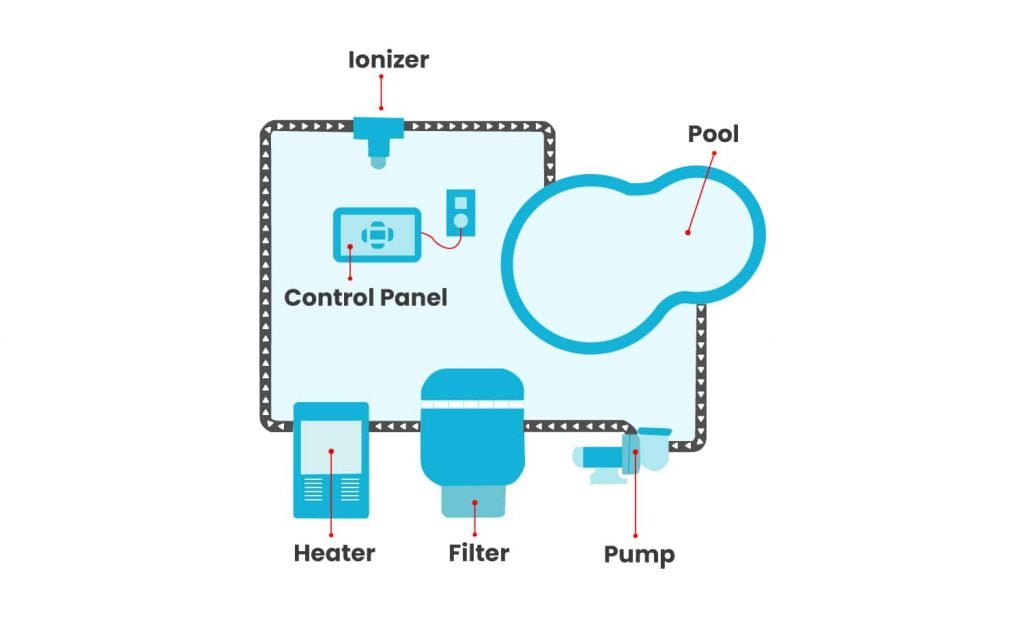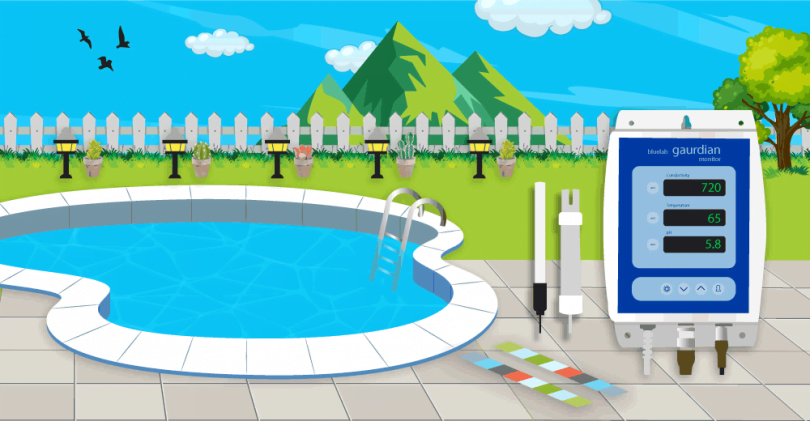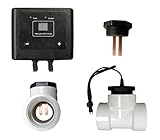Pool ionizers are designed to make your pools water more “balanced” (in terms of pH and TDS) by giving it small electrical charges to attract dirt particles in the pool to the ionizer itself, which is then filtered out with a filter pump or other filtration system (hint hint). The goal of having an ionized pool is to have a pool with less dirt floating in the water, making it a “cleaner” looking pool and supposedly even healthier.
A pool ionizer also works to attract more minerals to the water, which can make the pool softer. I think this is pretty cool. In this post, I will be explaining what pool ionizer is, its benefits, drawback, how it works, and much more. So, be sure to read it to the end.
- Complete with electronic control module, ionizer probe, threaded tee, low voltage...
- Electronically detects, monitors and controls microscopic levels of copper, silver and...
What is a Pool Ionizer?
Pool ionizers are devices that inject negative ions into the water through electrolysis, thereby changing pool water’s chemistry by converting chlorine or bromine to hypochlorous acid or hypobromous acid, respectively.
It’s a technology NASA uses to purify and preserve water while in space. What’s more, pool ionizers have been used commercially since 1998 in Europe. Since 2000, several American companies have developed their models or sold them under another company’s name.
The primary purpose behind this device is to reduce health risks associated with swimming pools. Its other benefits range from improved sparkle and odor control and enhanced equipment life, among others. However, there is little scientific evidence as to whether it works any better than just aeration without the need for electricity.
Some people, nonetheless, tout its benefits as well as the fact that it’s impossible to overdose. All these claims are yet to be validated by extensive research studies, but there is still hope for this device.
Even though pool ionizers are yet to be conclusively proven as effective in large swimming pools, some pool owners and researchers have attested to their high-quality performance.
Pool enthusiasts concerned about their health can consider this device an alternative to traditional chemical treatments because electrical cables are well insulated and waterproofed against leakage.
The additional cost of the machine will generally outweigh any savings made through lower chemical usage, which is one of its main selling points.
Although there is no way of knowing whether it works better than simply adding more aeration into the pool water, some claim that it does indeed present several benefits, including reduced costs plus enhanced safety for swimmers.
How Pool Ionizers Work
The positive electrode located on the ionizer connects through a transformer to an electrical source while the other end supplies negative ions into the water passing over it.

The electrolysis process converts chlorine or bromine into active forms of chlorine or bromine that disinfect water effectively.
Types of electrodes used include:
- Copper: It is a good conductor of electricity and corrodes quickly, but it replenishes over time.
- Titanium: This material has little to no corrosion, and it does not need galvanic replacement.
- Palladium: It has high durability and resistance to corrosion, enabling effective disinfection in water for more extended periods.
Charcoal filters are sometimes incorporated with the electrodes to remove any odor from decomposing organic matter in pools. Despite being referred to as “inert” gases, argon and helium are known to affect the pH levels in the water, hence are sometimes used to monitor pH control.
- ONLY COMPATIBLE WITH THE ORIGINAL SUN SHOCK FROM REMINGTON SOLAR: Copper Anode, consists...
- Copper Anode for Remington Pool Solar Ionizer that will help keep your swimming pool or...
The ionizers generally provide two methods of control:
- Automatic shut off: The machine kicks in when there’s less than 0.5 ppm in the pool and shuts down at 1ppm or more chlorine levels after 12 hours.
- Manual shut off: This can be done through an on/off switch or a simple timer that switches it off after a particular period, such as 8 hours.
Do Pool Ionizers Really Work?
Pools owners may be skeptical of this technology, but it is helpful to determine whether or not pool ionizers work before investing in one. The quality of installation and maintenance only limits the results of ionizers.
Some models contribute to poor performance since they require frequent replacement due to corrosion caused by electrolysis which limits their lifetime considerably.
Thus, it is recommended that users invest in high-quality machines with durable electrodes made using titanium or palladium materials whose benefits outweigh any limitations present.
What’s the Difference between a Pool Ionizer and a Mineral System
Mineral systems and pool ionizers do not work the same way since they rely on different processes to treat water. Pool ionizers use electrolysis while mineral systems use an ozone or ultraviolet [UV] process [or a combination of both] to disinfect water.
Both methods are effective, but pool owners need to consider various factors such as cost and ease of maintenance when deciding which one is right for them.
1) Mineral Systems
They work by adding mineral additives [such as calcium and magnesium] to the water, altering its chemical composition. The minerals in the water make it safer for swimmers because they eliminate bacteria, algae, and other harmful pathogens that can cause illnesses.
Mineral systems are effective when used correctly, but users need to know how much of each mineral is present to avoid causing any chlorine production or pH levels problems.
2) Pool Ionizers
Electrolysis works by producing ions through electrolytic cells located within machines. These are released into the pool triggering a chemical reaction that reduces contaminants removing them from the water, so they do not affect swimmers. There are two types of electrolytic processes generally used in pool ionizers:
a) Cation exchange – When positively charged ions exchange with the bad, harmful bacteria to render them harmless. It works by attaching itself to harmful contaminants causing them to dissolve in water not to build up, resulting in a contaminant-free pool.
The process also produces good minerals that swimmers can consume for increased energy and faster healing of wounds, so it is preferred over other mineral systems.
b) Anion Exchange – This mainly affects organic contaminants such as algae and mold, rendering them harmless [increasing water quality].
Pool Ionizers Compared To Mineral Systems
Pool ionizers are easier to use since there’s no need for any additional chemical additives when used correctly [although mineral systems are still effective when used with chemicals]. Pool ionizers also do not require the addition of salt necessary for some pool ions models, but they can be more expensive depending on the brand and model chosen.
Mineral Systems vs. Pool Ionizers: Which One Is Right For You?
Mineral systems and pool ionizers have their unique benefits, making them ideal for different users.
| Pool Ionizers | Mineral Systems |
|---|---|
| Still, pool ionizers are compact units installed in smaller areas providing similar benefits to ordinary mineral systems. | Miners systems also take up a lot of space, making them difficult for people who do not have large homes. |
| Pool ionizers are stand-alone units that sit beside your pool and need not be connected with the circulation system. | Mineral Systems works by moving water through ceramic discs that contain electrolytic minerals (ions) |
| It works by moving water through a disc containing electrolytic minerals (ions) called electrodes. | It oxidizes heavy metals (copper, silver, lead, etc.), chloramines (chlorine combined with amines), pesticides, herbicides, bacteria, viruses, and other contaminants harmful to humans. |
| The pool ionizer’s installation must be within five feet of the pool pump. | Mineral systems installation must be five feet from the pool pump since it directly connects to the circulation system. |
In conclusion, pool ionizers are stand-alone units that can be installed without dealing with the extra costs of purchasing a salt-chlorine generator. If your pool is large, you should purchase a mineral system since it’s more effective than pool ionizers.
How long do pool ionizers last?
It is recommended that users maintain their equipment regularly to increase its lifespan. The expected life span of an ionizer varies depending on the type of electrode used, other pool-related factors such as pH levels, organic content in water, and electrolysis caused by insufficient maintenance.
For example, the copper electrodes need galvanic replacement more frequently since they corrode quickly due to contact with water. Titanium models are also available with a shorter lifespan because they don’t corrode, making them more expensive than copper types.
The ideal duration between replacements is usually a few years, although it may be well below that mark depending on the pool’s content and several other elements. Some specific models have been known to last for more than 10 years when they are installed, used, and maintained properly.
Are there Risks Associated with Pool Ionizers?
There are no significant risks associated with this technology since it is based on electrolysis. However, the products needed for this technology, such as electrode materials, may pose environmental issues if they are not disposed of correctly or per the manufacturer’s instructions.
Although there are some risks associated with pool ionizers, they are usually minor. A primary risk of ionizer use is the exposure to radiation caused by the high voltage components.
In general, exposure to large amounts of electricity can cause electrocution and death. For this reason, it is important that the pool owner carefully examines all safety instructions before beginning to use a pool ionizer.
The electrical cords must be kept away from any water sources to avert a shocking accident. The entire unit must be allowed a proper dry period between uses to prevent damage due to moisture exposure.
Even though ionizer units are not completely waterproof, they should only be used in pools that have been appropriately designed for their respective parts.
Is It Necessary to Boost Pool Ionizer with Chlorine?
It is not necessary and can depend on the needs and expectations of the ionizer’s owner. Boosting with chlorine should only ensure that these machines are as effective as possible since they may not function optimally without it.
However, those who use them often will see little difference between using chlorine and other methods such as bromine tablets for this purpose.
While pool ionizers work, they are not the best oxidizers. Sometimes the contaminants might be too many for the ionizer to handle alone.
When that happens, a boost with chlorine might be a good idea. Even though its purpose is to kill bacteria, it also acts as an oxidizer giving the ionizer a hand in killing contaminants.
In general, boosting is advised once per week when using pool ionizers. There are some models where boosting is still needed even when using them daily because of their small capacity.
How to Maintain a Pool Ionizer
Maintaining a pool ionizer is simple, even if it’s not easy to understand how these machines work. These devices need regular cleaning because their electrolytic system interacts with contaminants in ways that could damage them.
Cleaning should be done according to the manufacturer’s instructions using products designed for this technology, such as vinegar or baking soda mixed with water to maintain pH levels within an acceptable range.
Depending on how often pool ionizers are used, owners may need to detoxify it more or less frequently than a traditional option that needs a similar treatment.
There are several steps that people should take when trying to clean or maintain their devices, including:
- Check for signs of corrosion indicated by the presence of dark spots on the electrodes, which must be replaced immediately to avoid additional damage.
- Cleaning may be done using standard cleaners but make sure they are compatible with electrode materials since some alternatives can cause oxidation.
- Always replace parts when the manufacturer recommends after consulting about inspection details included in the product manual.
What are the Benefits of Using Pool Ionizer over Chlorine?
Pool ionizers can refresh water, enhance the pH level and avoid the damage that chlorine can cause.
This technology is also more effective in treating water since it has a precise control mechanism. It means that technicians do not need to add chemicals into the pool to work correctly.
The longevity of this treatment provides people with long-term enjoyment of their pools without needing regular maintenance or costly repairs.
Here are the benefits you can reap if you switch from chlorine to pool ionizer as the primary pool sanitizer:
1) Less frequent maintenance
Pool ionizers require yearly maintenance, while traditional options need a weekly boost to stay efficient. What’s more, they reduce the frequency of pool shocking because the ionizer helps maintain the proper chlorine level.
The time it takes to shock a pool can be reduced up to 40%. With pool ionization, less total chlorine is required, which means you’ll use fewer chemicals and save money on supplies.
Pool owners using saltwater pools will still need to purchase sanitizing agents but require about 33% less than those with traditional chlorine pools.
2) Reduced safety risks
Some studies show that swimming in water treated with pool ionizers has contributed to better health without chlorine or bromine’s negative effects.
3) Better sanitation
Pool ionizers use electrolysis to eliminate contaminants and oxygen for a refreshing experience minus the harsh effects of chemicals which can damage hair, skin, and clothes, not forgetting that the smell of chlorine is unpleasant for some people.
4) Lower cost
You can reduce your overall costs by lowering your reliance on chemicals. It takes less time for the electrolytic system to revitalize water, saving both time and money within a few months of its installation. Switching from chlorine to pool ionizer helps you save enough for occasional parts replacements since chlorine corrodes these devices faster than expected.
5) Environment-friendly
Using pool ionizers reduces the number of chemicals that water needs for treatment which is better for our environment and can even help you lower your monthly energy bill. A pool ionizer makes your swimming experience more enjoyable while protecting the planet at the same time.
6) Reduced Wear on Pool Equipment
Pool ionizers do not stress the pool equipment, such as ladders, fittings, and cleaning devices. Using chlorine also corrodes parts faster than expected, a better solution for your swimming experience and expensive equipment.
What are the Pool Ionizer Drawbacks?
Since ionizers are still a relatively new technology for treating pools, there are some disadvantages that owners need to be aware of before setting up this system.
1) Price
Pool ionizers are more expensive when compared to other options such as chlorine and bromine. The initial investment is high, which can be a deterrent to those looking for an affordable alternative. However, pool owners should consider this option as a long-term investment to reap the numerous benefits that come along with it.
2) Initial Set-up
While it is not complicated, the process may take longer than expected, especially for people who have no experience with alternative systems for pool water treatment. Depending on your location, a professional might need to install the system, which adds to overall costs, so it is best to do it yourself or ask a friend for help.
3) Higher energy bills
To power up pool ionizers, you will be required to use more energy from your local power grid, which could lead to higher monthly bills than using chlorine as the primary sanitizer. But this is something you can avoid if you invest in a solar pool ionizer, which uses sunlight instead of electricity.
- DEVELOPS A CLEAR POOL WITH SOLAR POWER: Finally, you can have a beautifully blue pool,...
- USE 80-PERCENT LESS CHLORINE, SAVE $300-TO-$500 EVERY YEAR: With less chlorine & shock,...
4) Still need chorine boosting
While ionizers are efficient in keeping water purified, they will still require you to boost it with chlorine or bromine, so the entire system is not 100% effective. It takes time to start acting on the contaminants, and a booster can help it out. However, this is a minor setback since most owners do not have enough time for weekly treatments of their pools, so pool ionizers are still more practical for this purpose.
Related Questions
Can you use a pool ionizer in a saltwater pool?
Yes, a pool ionizer can be used in a saltwater pool as long as the chlorine or electrolytic system is sized accordingly. Pool owners need to take note of their water pH and total alkalinity, which should remain within proper limits so the machine’s performance will not be compromised.
How do you clean copper pool ionizer?
Copper ionizers come with a soft wire brush provided to help you scrub out any build-up on the copper rod. This will work most of the time, but you might need some vinegar to loosen the dirt up.
Does solar pool ionizer work?
Yes, solar pool ionizers work just like the standard electrical ionizers, but they use sunlight instead of electricity from the grid. The system requires sunlight to power up, which means you have to position it in an unobstructed location. According to online reviews, solar pool ionizers do work reliably well.





Leave a Comment